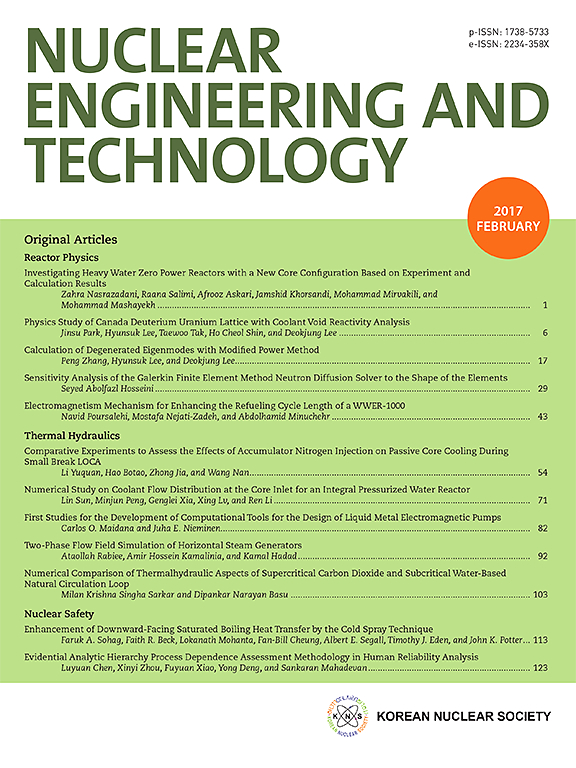Verification of the modified point kinetics model in the MARS code for molten salt reactors
IF 2.6
3区 工程技术
Q1 NUCLEAR SCIENCE & TECHNOLOGY
引用次数: 0
Abstract
This study presents the implementation and verification of a modified point kinetics model (PKM) within the thermal-hydraulic system code MARS for application to liquid-fueled molten salt reactors (MSRs). Traditional PKMs for MSRs establish the delayed neutron precursor (DNP) balance equation by simplifying the reactor system into two regions: a reactor core and an external loop only. This approach is inadequate for realistic MSR systems with complex flow paths. To overcome this limitation, a three-dimensional DNP transport equation was introduced into the PKM instead of DNP balance equation, enabling a more accurate treatment of precursor distribution throughout the reactor system. The model was numerically solved in the MARS code using the upwind scheme, and the effective delayed neutron fraction was evaluated from steady-state precursor distributions. Verification of the modified PKM in the MARS code was performed through comparison with exact analytical solutions and the independently developed GAMMA + code. The results confirm the correctness and numerical accuracy of the modified PKM and demonstrate the MARS code's capability for both steady-state and transient analysis of liquid-fueled MSRs.
熔盐堆MARS代码中修正点动力学模型的验证
本研究提出了一个改进的点动力学模型(PKM)在热压系统代码MARS中的实现和验证,用于液体燃料熔盐反应堆(MSRs)。传统的核反应堆PKMs通过将反应堆系统简化为堆芯和外环两个区域来建立延迟中子前体(DNP)平衡方程。这种方法不适用于具有复杂流路的实际MSR系统。为了克服这一限制,在PKM中引入了三维DNP输运方程而不是DNP平衡方程,从而能够更准确地处理整个反应器系统中的前驱体分布。采用逆风格式在MARS代码中对该模型进行了数值求解,并根据稳态前驱体分布计算了有效延迟中子分数。通过与精确解析解和独立开发的GAMMA +代码进行比较,验证了MARS代码中修改后的PKM。结果证实了改进后的PKM的正确性和数值精度,并验证了MARS代码对液体燃料MSRs进行稳态和瞬态分析的能力。
本文章由计算机程序翻译,如有差异,请以英文原文为准。
求助全文
约1分钟内获得全文
求助全文
来源期刊

Nuclear Engineering and Technology
工程技术-核科学技术
CiteScore
4.80
自引率
7.40%
发文量
431
审稿时长
3.5 months
期刊介绍:
Nuclear Engineering and Technology (NET), an international journal of the Korean Nuclear Society (KNS), publishes peer-reviewed papers on original research, ideas and developments in all areas of the field of nuclear science and technology. NET bimonthly publishes original articles, reviews, and technical notes. The journal is listed in the Science Citation Index Expanded (SCIE) of Thomson Reuters.
NET covers all fields for peaceful utilization of nuclear energy and radiation as follows:
1) Reactor Physics
2) Thermal Hydraulics
3) Nuclear Safety
4) Nuclear I&C
5) Nuclear Physics, Fusion, and Laser Technology
6) Nuclear Fuel Cycle and Radioactive Waste Management
7) Nuclear Fuel and Reactor Materials
8) Radiation Application
9) Radiation Protection
10) Nuclear Structural Analysis and Plant Management & Maintenance
11) Nuclear Policy, Economics, and Human Resource Development
 求助内容:
求助内容: 应助结果提醒方式:
应助结果提醒方式:


